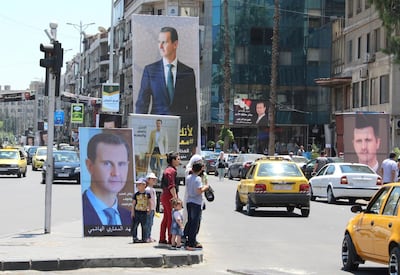In March 2011 in the southern Syrian city of Deraa, protests began the country's uprising with a simple chant of patriotic resistance: "God, Syria, freedom." Ten years later, in the streets of Damascus, one of patriotic subservience can be heard instead: "God, Syria, and Bashar only". This version is the victory cry of President Bashar Al Assad's supporters after it was announced on Friday he won over 95 per cent of the vote in recent presidential elections.
The result is widely viewed as a sham, and even for his most ardent followers there is no hiding from the terrible position in which the country now finds itself. Conservative estimates suggest that 500,000 Syrians have died in the country's civil war, which began as a movement demanding more rights, but not necessarily the fall of Al Assad.
Over the course of 21 years, Al Assad has been been elected to office a total of four times. On each occasion, he has been declared the winner with close to 100 per cent of the vote and on each he has done little to address Syria's longstanding issues, relating primarily to the country's broken economy and politics, which ultimately resulted in 2011's uprising.
While the war the uprising birthed appears to be in its diminuendo, Syria’s territory remains fragmented and its economic woes have worsened. And while Al Assad's position now appears to be the strongest it has been since the uprising, that is the case only because of a deeply repressive administration and disregard for political consensus.
As he enters the first days of his fourth term, Al Assad will need to confront and address the legacy of his two decades in power. Eighty per cent of people in the country are thought to be living below the poverty line, according to the UN. The government controls just 60 per cent of its pre-war territory, and estimates suggest that there are over 6.5 million Syrian refugees across the world and just over 6 million more displaced internally.
In an attempt to salvage a stable idea of what it means to be a Syrian citizen after the war, the UN has been pushing the government and opposition parties to discuss constitutional reform. The beleaguered idea was floated as far back as 2012, but it was only in 2019 that a Syrian Constitutional Committee, comprising representatives from the government, opposition parties and civil society groups, was convened. This questionable election result will likely be used by Al Assad's side to stall talks further, and claim false legitimacy in negotiations.
The war also saw Damascus under Al Assad go from being a crucial and founding member of the Arab League to a regional outcast that relied on the support of non-Arab allies to survive. If modern Syria is to claw back the semblance of a modern state, Al Assad's administration must endeavour to rebuild trust with its neighbours, as well as his own people. That will require a great deal of work after a regionally destabilising catastrophe of a war for which his governance was largely responsible.
Standing on the threshold of another seven years in power, Al Assad has a choice. There will be no long-term stability or prosperity in a "Bashar only" state. If he really does stand for Syria, he will have to break with precedent and work towards building a government and state for all citizens, particularly those still scattered across the world in traumatic limbo. It is a long shot but one that is desperately needed.



